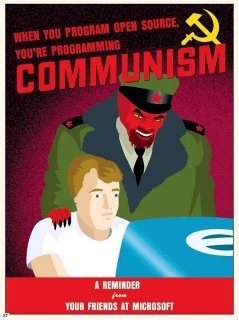 Ya he comentado aquí en varias ocasiones lo mucho que me gusta la revista Spectrum del IEEE. Todos los meses trae artículos super interesantes sobre tecnología en general, con una fuerte componente en la informática en particular. Merece la pena hacerse del IEEE aunque sea sólo por recibirla.
Ya he comentado aquí en varias ocasiones lo mucho que me gusta la revista Spectrum del IEEE. Todos los meses trae artículos super interesantes sobre tecnología en general, con una fuerte componente en la informática en particular. Merece la pena hacerse del IEEE aunque sea sólo por recibirla.
El caso es que en el número de Noviembre (que no había tenido tiempo de leer hasta hoy, ya en Diciembre) viene un artículo titulado "Open-Source Warfare" (se puede leer on-line también) que hace un interesante paralelismo entre los modos de proceder de las células terroristas que actúan en Iraq y otros sitios y los grupos de desarrollo estilo Open-Source. La intención del artículo no es criticar a este tipo de organización, sino todo lo contrario, y es alabar la forma de gestión ágil y orientada al resultado de estos grupos, en contraste con el inmovilismo y falta de agilidad de los Gobiernos (grandes empresas en el simil). Por ejemplo:
"Robb calls this new type of conflict “open-source warfare,” because the manner in which insurgent groups are organizing themselves, sharing information, and adapting their strategies bears a strong resemblance to the open-source movement in software development. Insurgent groups, like open-source software hackers, tend to form loose and nonhierarchical networks to pursue a common vision, Robb says. United by that vision, they exchange information and work collaboratively on tasks of mutual interest."
o también:
"The reliance on IT also enables open-source groups to identify and respond to problems much more rapidly than a more structured, top-down entity can—be it the Pentagon or a large software company such as Microsoft."
y
"Mimicking open-source developers, insurgent groups 'hack at the source code of warfare', Robb says. By that, he means they aren't bound by the traditional rules of military engagement; they use whatever works, with their tactics, techniques, and procedures all open to scrutiny and improvement by the community. Although such groups are weak by conventional military benchmarks—they'd clearly be outgunned and outmanned on an open battlefield—they can still threaten strong national militaries. That's because they don't aim to invade, hold, or govern territory, but rather to exert political influence by exhausting an adversary's capacity to fight back."
Aunque también hay afirmaciones que sacadas de contexto son claramente incendiarias, como esta en la que se compara a los terroristas y a la mafia organizada con el Open Source:
"In studying the behaviors of insurgencies in Iraq and elsewhere, as well as organized-crime syndicates and other groups, Robb noticed the many parallels to the open-source model in software."
¡Que fuerrrte! jeje
Interesante artículo que os recomiendo leer. Incluso hace referencia al mítico artículo "La Catedral y el Bazar" que es el inspirador de la comunidad Open Source.
En general estoy de acuerdo con que un grupo de grupos coordinados de manera natural con la ayuda de Internet, así como las empresas pequeñas y ágiles, orientadas a los resultados, pueden ser mucho más efectivas que cualquuier gran empresa ahogada por su propia burocracia y procedimientos. Es una interesante reflexión. Ahí queda...
💪🏻 ¿Este post te ha ayudado?, ¿has aprendido algo nuevo?
Pues NO te pido que me invites a un café... Te pido algo más fácil y mucho mejor
